- Home
- Quizzes
- My Quiz Activity
- Newsletters
- Sports Betting
- MY FAVORITES
- Add Sports/Teams
- SPORTS
-
NFL
- NFL Home
- Arizona Cardinals
- Atlanta Falcons
- Baltimore Ravens
- Buffalo Bills
- Carolina Panthers
- Chicago Bears
- Cincinnati Bengals
- Cleveland Browns
- Dallas Cowboys
- Denver Broncos
- Detroit Lions
- Green Bay Packers
- Houston Texans
- Indianapolis Colts
- Jacksonville Jaguars
- Kansas City Chiefs
- Las Vegas Raiders
- Los Angeles Chargers
- Los Angeles Rams
- Miami Dolphins
- Minnesota Vikings
- New England Patriots
- New Orleans Saints
- New York Jets
- New York Giants
- Philadelphia Eagles
- Pittsburgh Steelers
- San Francisco 49ers
- Seattle Seahawks
- Tampa Bay Buccaneers
- Tennessee Titans
- Washington Commanders
-
MLB
- MLB Home
- Arizona Diamondbacks
- Atlanta Braves
- Baltimore Orioles
- Boston Red Sox
- Chicago White Sox
- Chicago Cubs
- Cincinnati Reds
- Cleveland Guardians
- Colorado Rockies
- Detroit Tigers
- Houston Astros
- Kansas City Royals
- Los Angeles Angels
- Los Angeles Dodgers
- Miami Marlins
- Milwaukee Brewers
- Minnesota Twins
- New York Yankees
- New York Mets
- Oakland Athletics
- Philadelphia Phillies
- Pittsburgh Pirates
- San Diego Padres
- San Francisco Giants
- Seattle Mariners
- St. Louis Cardinals
- Tampa Bay Rays
- Texas Rangers
- Toronto Blue Jays
- Washington Nationals
-
NBA
- NBA Home
- Atlanta Hawks
- Boston Celtics
- Brooklyn Nets
- Charlotte Hornets
- Chicago Bulls
- Cleveland Cavaliers
- Dallas Mavericks
- Denver Nuggets
- Detroit Pistons
- Golden State Warriors
- Houston Rockets
- Indiana Pacers
- Los Angeles Clippers
- Los Angeles Lakers
- Memphis Grizzlies
- Miami Heat
- Milwaukee Bucks
- Minnesota Timberwolves
- New Orleans Pelicans
- New York Knicks
- Oklahoma City Thunder
- Orlando Magic
- Philadelphia 76ers
- Phoenix Suns
- Portland Trail Blazers
- Sacramento Kings
- San Antonio Spurs
- Toronto Raptors
- Utah Jazz
- Washington Wizards
-
NHL
- NHL Home
- Anaheim Ducks
- Arizona Coyotes
- Boston Bruins
- Buffalo Sabres
- Calgary Flames
- Carolina Hurricanes
- Chicago Blackhawks
- Colorado Avalanche
- Columbus Blue Jackets
- Dallas Stars
- Detroit Red Wings
- Edmonton Oilers
- Florida Panthers
- Los Angeles Kings
- Minnesota Wild
- Montreal Canadiens
- Nashville Predators
- New Jersey Devils
- New York Islanders
- New York Rangers
- Ottawa Senators
- Philadelphia Flyers
- Pittsburgh Penguins
- San Jose Sharks
- Seattle Kraken
- St. Louis Blues
- Tampa Bay Lightning
- Toronto Maple Leafs
- Vancouver Canucks
- Vegas Golden Knights
- Washington Capitals
- Winnipeg Jets
- NCAAF
- NCAAM
- Boxing
- Entertainment
- Lifestyle
- Golf
- MMA
- Soccer
- Tennis
- Wrestling
- More Sports
- RESOURCES
- My Account
- YB on Facebook
- YB on Twitter
- YB on Flipboard
- Contact Us
- Privacy Policy
- Terms of Service
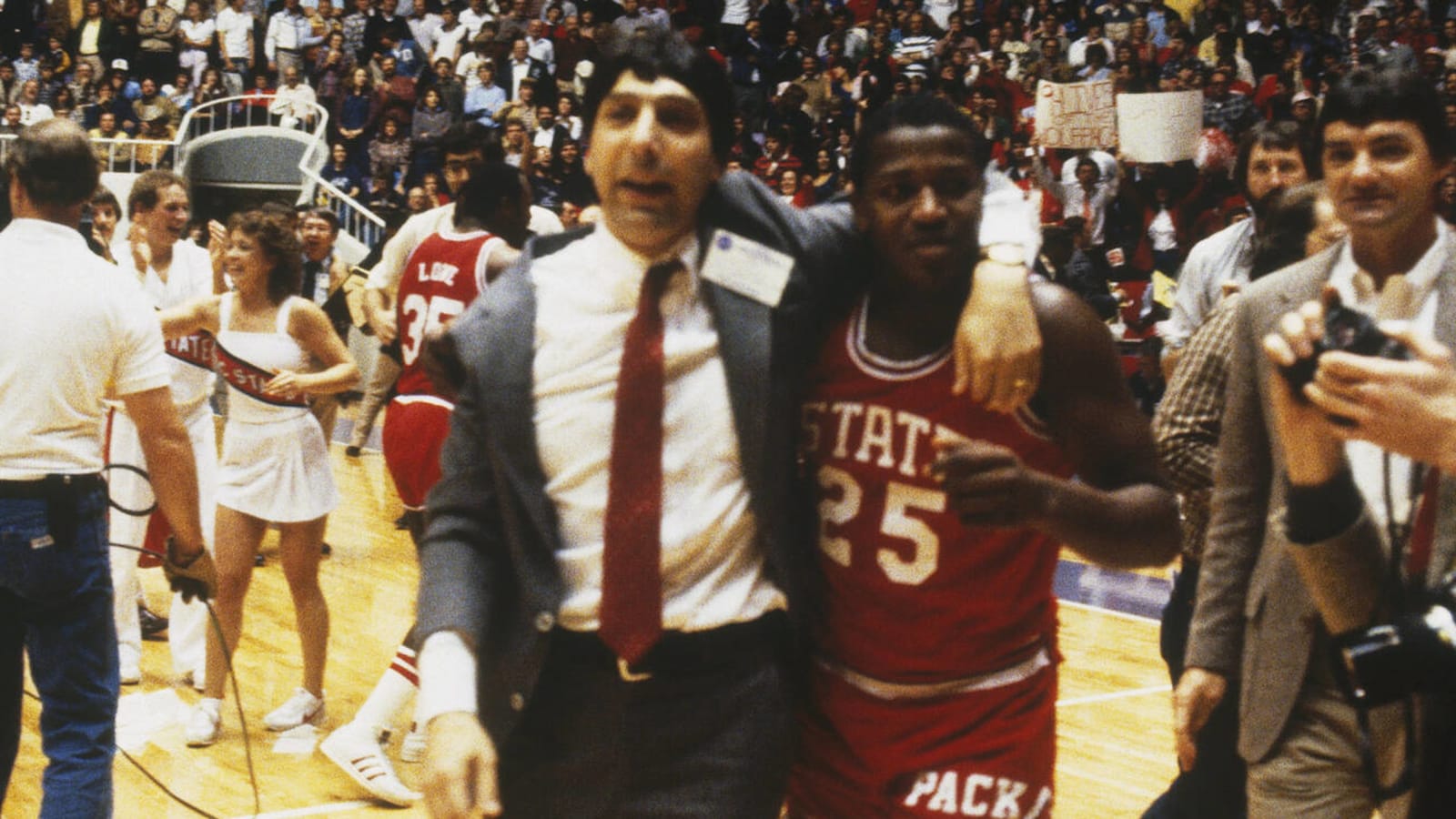
Most unlikely men's college basketball national champions
Not all NCAA men's basketball national championships are created equal. Some stunned the hoops world, others found their season prime a little later than others, while even more caught lightning in a bottle.
Here is our ranking of 20 unlikely national champions.
Most unlikely men's college basketball national champions

Here is our list of the 20 best men's players in Virginia basketball history. Listed in chronological order.
20. Baylor (2020-21)
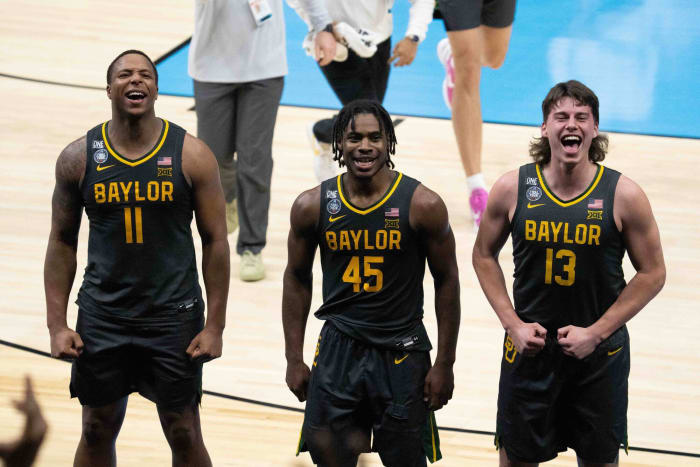
First off, Baylor was well-deserving and a more-than worthy first-time national champion to conclude the '20-'21 season. However, entering the national final, all pundits and fans seemed to be talking about was opponent Gonzaga's quest to win its first title and cap an undefeated season. The 28-2, third-seeded Bears seemed like an afterthought. Then Davion Mitchell, Jared Butler and Co. dominated from the start. Baylor hit 43.5-percent of its 3-point attempts and held a 16-5 advantage on the offensive glass en route to an 86-70 rout of the Zags for one of the great performances in the history of the national championship game.
19. Texas Western (1965-66)
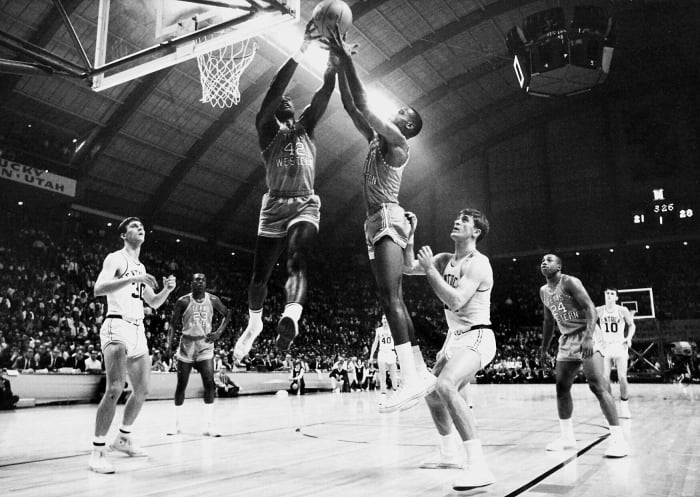
The story of Texas Western's run to the 1966 national title is one of the most important in all sports history. The Miners' 1966 national final win over an all-white and extremely talented Kentucky team remains a significant event in terms of the American civil rights movement. Coached by Don Haskins, who didn't see color, but only talent, when it came to his athletes, Western was the first squad to win a national championship with five black starters. It beat Kentucky, among the country's great programs and one that, as often reported, sided with conformity when it came to the racial perspective of the times. Bobby Joe Hill scored 20 points to lead Texas Western, which shot 45 percent from the field and went 28-of-34 from the free-throw line to claim the title with a 27-1 record.
18. CCNY (1949-50)
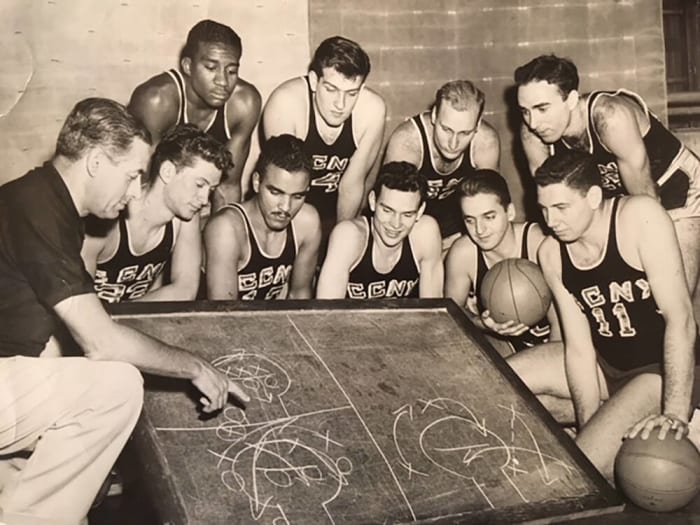
The City College of the City University of New York enjoyed much success in 1950. In addition to winning the eight-team NCAA Tournament championship, CCNY also claimed the NIT title that year. The Beavers, who went 24-5 that season, met a 32-win Bradley squad in the national final. CCNY star Irwin Dambrot scored 15 points in the championship contest, and was the beneficiary of a late non-call on what seemed like a foul on Gene Melchiorre, that could have put the Braves in position to win the game. Of course, this was the same CCNY team known for the infamous college basketball point-shaving scandal of the late 1940s and into 1950. That ultimately led to the Division I demise of the program.
17. Wisconsin (1940-41)
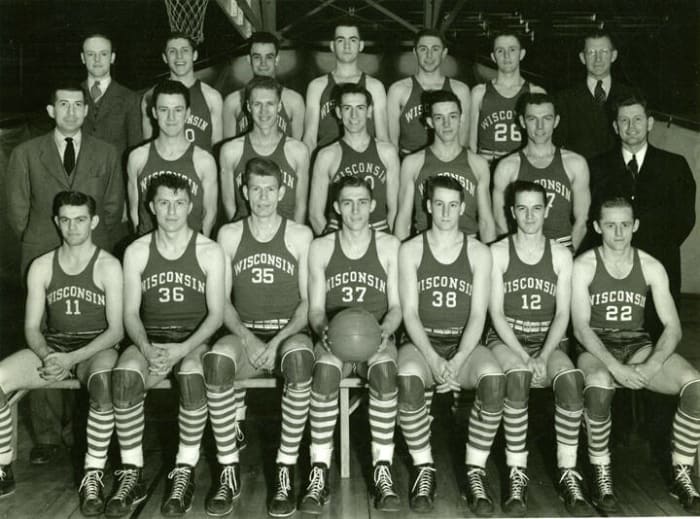
When these Badgers, coached by Harold "Bud" Foster sat 3-2, then eventually 5-3, there wasn't much thought of winning a national championship. However, following a 17-point loss to Minnesota in their Big Ten opener, the Badgers never lost again. Paced by breakout stars John Kotz and Gene Englund, Wisconsin won 15 in a row. Highlighted by that 39-34 win over Washington State in the NCAA Tournament final to claim, what remains, the program's only national championship in men's basketball.
16. Louisville (1985-86)
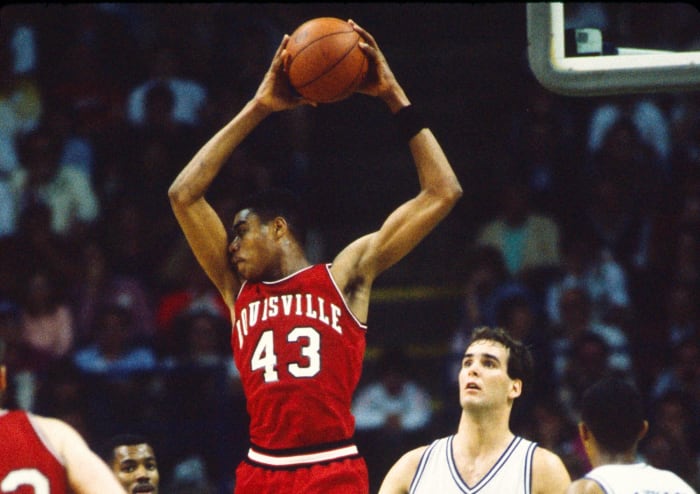
Really? A No. 2 seed that won 11 consecutive games entering the NCAA Tournament is unlikely to win it all? Well, when its national-final opponent is a 37-win Duke squad that's the No. 1 seed and had not lost since Jan. 21 of '86, then the Cardinals had a tall task in front of them. However, "Never-Nervous" Pervis Ellison recorded 25 points and 11 rebounds for one of the greatest title-game performances by a freshman in NCAA history. As a team, Louisville shot 58 percent from the field and held the Blue Devils to 40.3 percent for a 72-69 triumph.
15. Kentucky (1957-58)
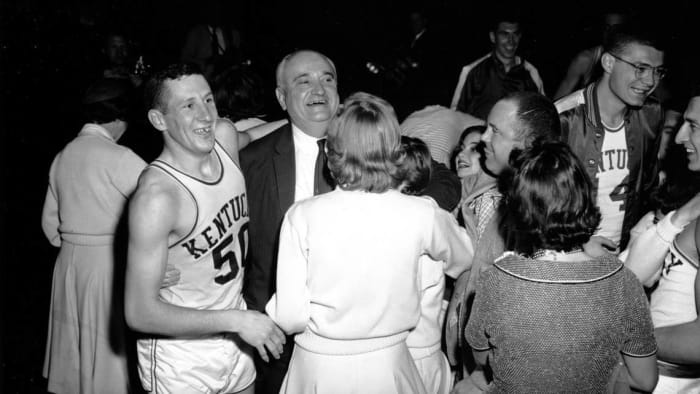
Kentucky already had three national championships under its belt when the 1957-58 season rolled around. Adolph Rupp was college basketball coaching royalty, but these Wildcats entered the '58 NCAA Tournament with six losses — one fewer than Rupp's previous three title-winning teams combined. Kentucky closed the regular season 3-2, so it was right to question whether a fourth title was truly attainable. Well, it was. After pulling out a one-point victory over Temple in the national semifinal, the Wildcats erased a pair of 11-point first-half deficits to beat superstar Elgin Baylor and Seattle 84-72 for the championship.
14. UCLA (1974-75)
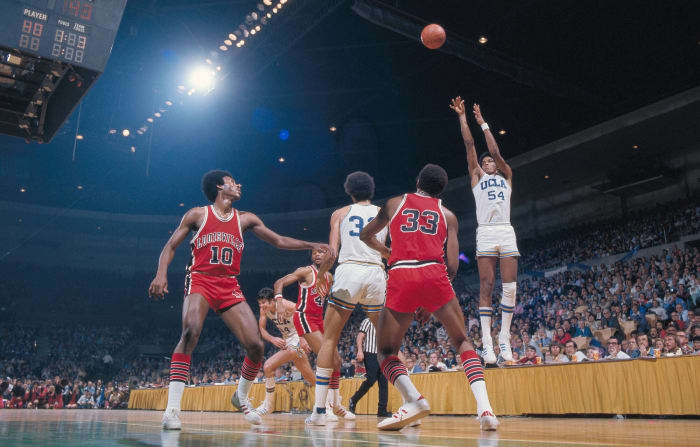
UCLA won nine national titles from 1964-1973, but by the 1975 NCAA Tournament, the Bruins' overall dominance on the hardcourt seemed to be waning. The 1973-74 group had four losses and was stunned by eventual national champion North Carolina State in the Final Four. Entering the '75 event, UCLA had three regular-season losses and no superstars, thus leaving many wondering if a 10th title was possible. While it wasn't easy, requiring overtime victories over Michigan and Louisville just to reach the national championship game, the Bruins were indeed the last ones standing. Richard Washington's 28 points fueled UCLA to a 92-85 title-game win over fellow perennial power Kentucky in what was legendary coach John Wooden's final game.
13. Holy Cross (1946-47)

Tiny Holy Cross had just three losses on the 1946-47 campaign, but was seeded last in the eight-team NCAA Tournament field that season. But in their first appearance in the tournament, Doggie Julian's group, which included star Joe Mullaney and a freshman point guard named Bob Cousy, ran the table. The Crusaders, aka the "Cinderella Kids," capped a 23-game winning streak with their 58-47 victory over Oklahoma to become the first and, to date, only school from Massachusetts to win a Division I basketball national championship.
12. Duke (1990-91)
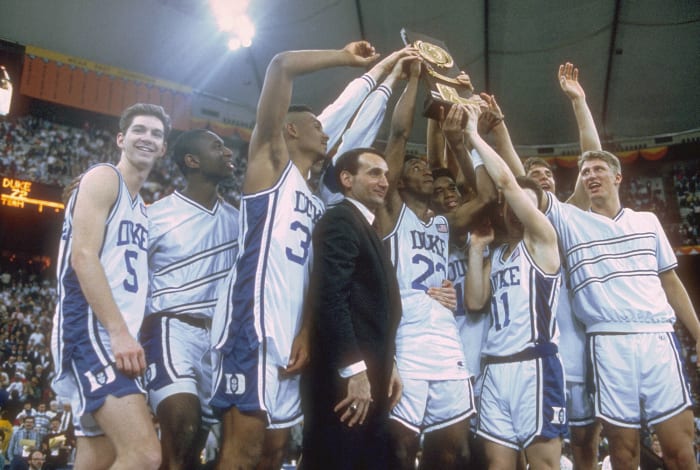
After being humiliated by UNLV during a 103-73 loss in the 1990 national championship game, the Blue Devils were back at the Big Dance as a No. 2 seed with seven losses. And, as things would go, Duke found itself in a rematch with the undefeated and favored Runnin' Rebels in the national semifinals. Given little chance to prevail, the Blue Devils might have played the greatest game in the history of the storied program. Star Christian Laettner scored 28 points, Duke shot 51.8 percent as a team and held UNLV stars Larry Johnson and Stacey Augmon to 19 combined points en route to the 79-77 upset victory. The Blue Devils then capped their rather surprising run with a 72-65 win over Kansas for the school's first national title.
11. Marquette (1976-77)
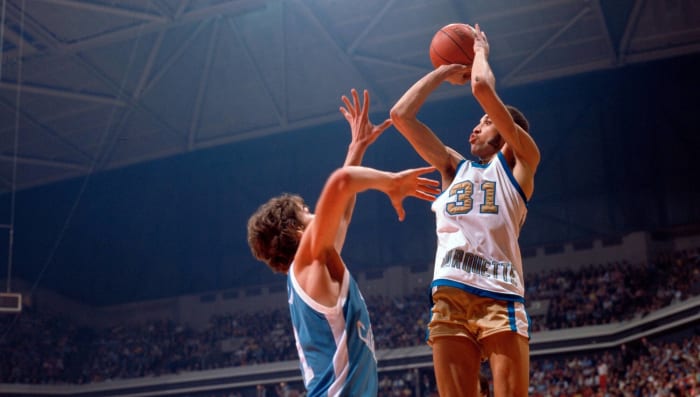
When Marquette bested Dean Smith and vaunted North Carolina, 67-59 in the NCAA Tournament final, it became the first team, at the time, with at least seven losses to win a national title. Five of those defeats came during the then-Warriors' final 11 regular-season games. But Butch Lee, Bo Ellis and Jerome Whitehead got hot in the tournament, as Marquette beat five ranked opponents to win the school's first and, to date, only national championship in beloved coach Al McGuire's farewell season.
10. Connecticut (2010-11)
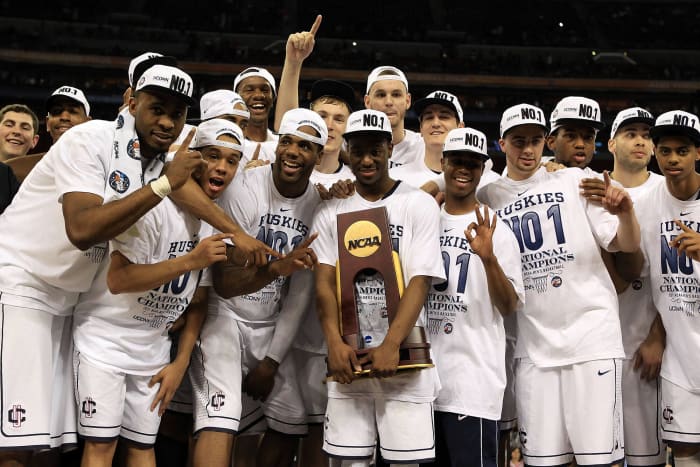
Some fans or college hoops pundits might think these Huskies caught a series of breaks to win the school's third national title, considering as the No. 3 seed, they faced lower seeds from the Elite Eight on. That said, UConn started 17-2, then endured a 4-7 stretch to tie for ninth in the Big East. However, Kemba Walker and the Huskies somewhat magically refocused to win 11 in a row, capping that impressive run with a 53-41 victory over Cinderella eight-seeded Butler in the national final. Since UConn's triumph in 2011, no team has won a national title with more than eight losses.
9. California (1958-59)
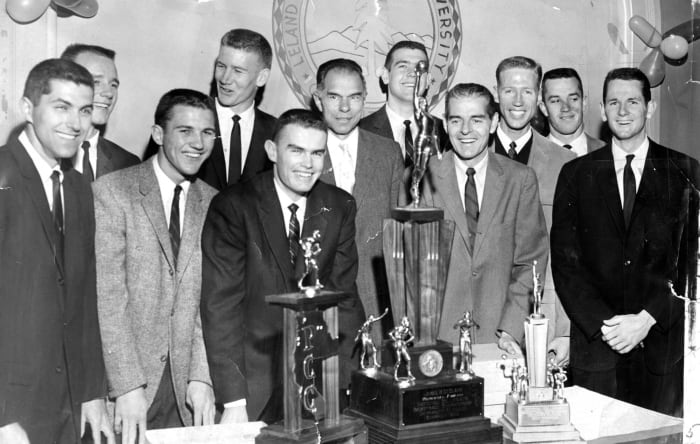
The 1959 national championship game is still one West Virginia fans cringe at when thinking about. In the only national final in program history, the Jerry West-led Mountaineers failed to hold a 13-point first-half advantage. Cal, meanwhile, fought back to pull out the 71-70 victory thanks to Darrall Imhoff's bucket with 17 seconds remaining. West finished 28 points and 11 rebounds. Meanwhile, the Golden Bears (24-5) still seem like an afterthought even though they won their final 16 games, and beat an Oscar Robinson-led Cincinnati squad in the national semifinals before taking down West and the Mountaineers.
8. Indiana (1980-81)
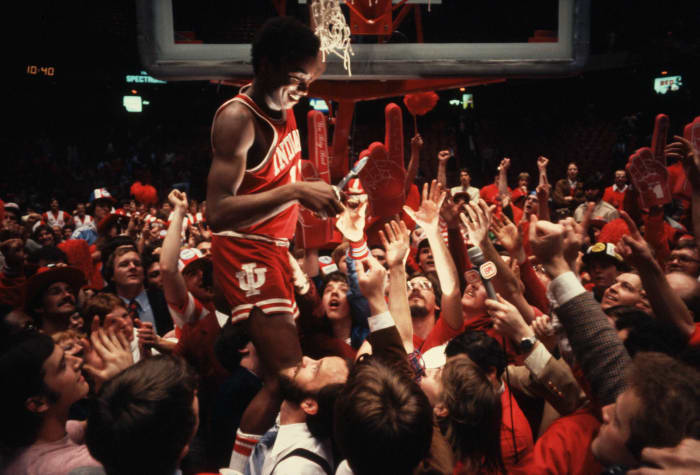
Underachievement is not taken lightly within the Indiana basketball program, regardless who is in charge. But, especially when Bob Knight is around. So, when it mattered most, Knight's second NCAA championship squad stepped up its collective game, but notably eventual legendary guard Isiah Thomas. The Hoosiers opened the NCAA Tournament as the No. 3 seed with nine losses — five coming in December. However, Indiana's closest margin of victory during the Big Dance was 13 points in the title-game victory over second-seeded North Carolina. That came after it downed No. 1 LSU by 18 in the semifinal.
7. Michigan (1988-89)
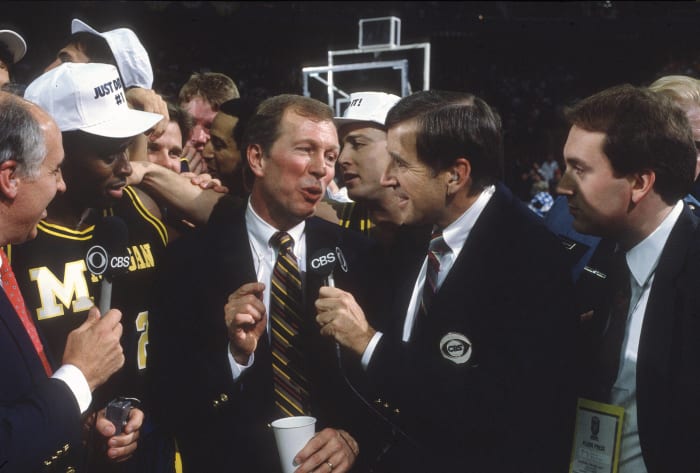
Talk about getting hot at the right time — and amid adversity. These Wolverines were poised for big things in 1988-89, and spent roughly half the campaign ranked in the top 10. However, they took seven losses into the NCAA Tournament, and before the event began, coach Bill Frieder announced he was leaving at the conclusion of the season to coach Arizona State. Athletic director and legendary football coach Bo Schembechler made Frieder resign immediately. Assistant coach Steve Fisher took over, and Michigan caught fire behind Glen Rice and Rumeal Robinson, claiming the school's first national title with a highly entertaining overtime victory over upstart Seton Hall in a battle of No. 3 seeds.
6. Syracuse (2002-03)
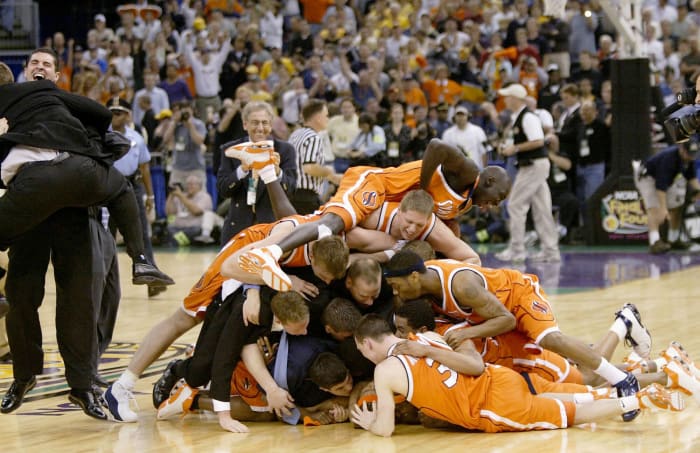
As noted with other teams on this list, a very good team can still surprise when it comes to being the last group standing at the Big Dance. Case in point with this Syracuse squad. Then known as the Orangemen, the program's only national championship team won 30 games and never lost consecutive contests all season. However, with only one senior on the team, Jim Boeheim's squad was not given much chance as the No. 3 seed in the NCAA Tournament. Then, freshman phenom Carmelo Anthony took his game to another level from the Sweet 16 on, averaging 24.3 points, 11.3 rebounds and going 7-of-13 from three-point range in wins over Oklahoma, Texas and national runner-up Kansas.
5. Arizona (1996-97)
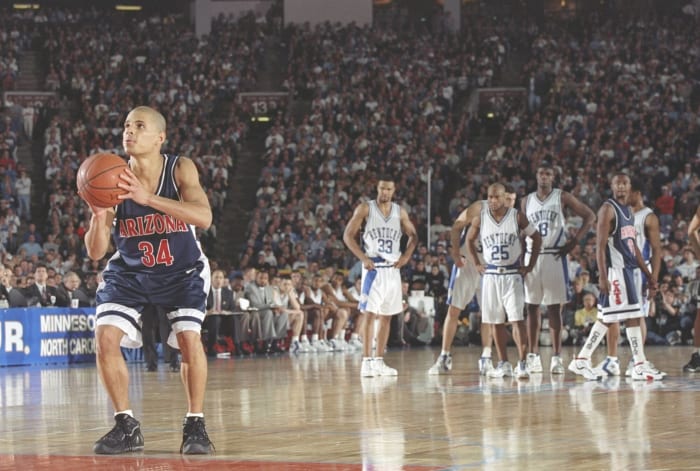
With a roster that included notable names like Mike Bibby, Miles Simon, Michael Dickerson and Jason Terry, these Wildcats should have been really good. Ultimately, the Wildcats were the class of the country. However, they went 11-7 against Pac-10 competition and earned a fourth seed in the NCAA Tournament. The same Arizona team that dropped its final two games heading into the Big Dance stormed to the program's first national championship thanks to victories over three No. 1 seeds: Kansas in the Sweet 16, North Carolina in the national semifinal and Kentucky in the championship game.
4. Connecticut (2013-14)
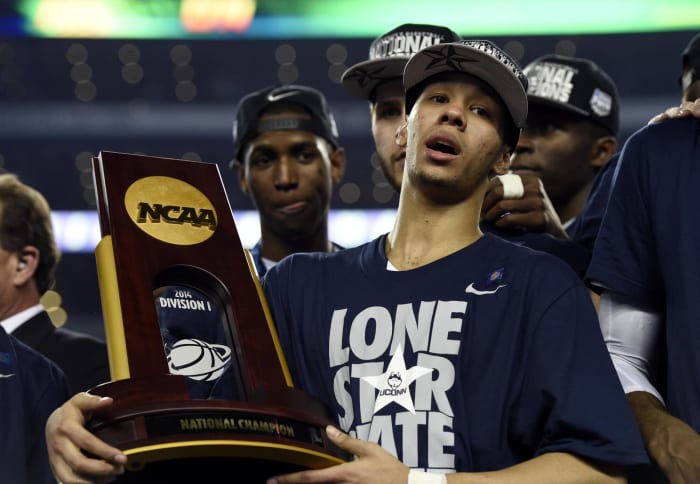
The 2014 NCAA Tournament might best be described as the bizarro Big Dance. UConn's fourth — and most recent — national championship and second in four seasons was historic. Historic in the sense that the title-game participants — the seventh-seeded Huskies and No. 8 Kentucky — totaled the highest seed (15) for a national final. Connecticut entered with eight losses, but reached the American Athletic Conference Tournament title game, so it was an improved squad. Then the Huskies knocked off No. 2 seed Villanova, third-seeded Iowa State, No. 4 Michigan State and top-seeded Florida en route to becoming the first seventh seed to win it all.
3. Kansas (1997-88)
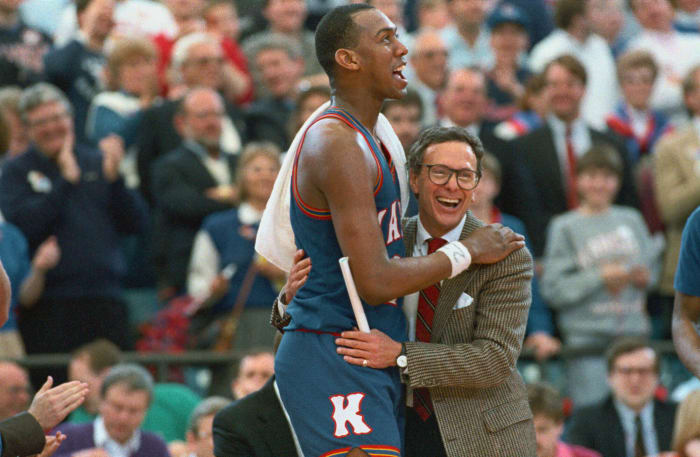
These Jayhawks were filled with high expectations entering the season, but they lost two of their first three games and endured a four-game losing streak during the campaign. When it came time for the postseason, Kansas entered the NCAA Tournament with 11 losses, but won three of its first four games by double digits. Then, the Jayhawks beat No. 1 seed Duke in the national semifinal and got 31 points and 18 rebounds from Danny Manning in an 83-79 title-game win over rival and favorite Oklahoma. Danny and the Miracles" would give Larry Brown his only collegiate national championship.
2. North Carolina State (1982-83)
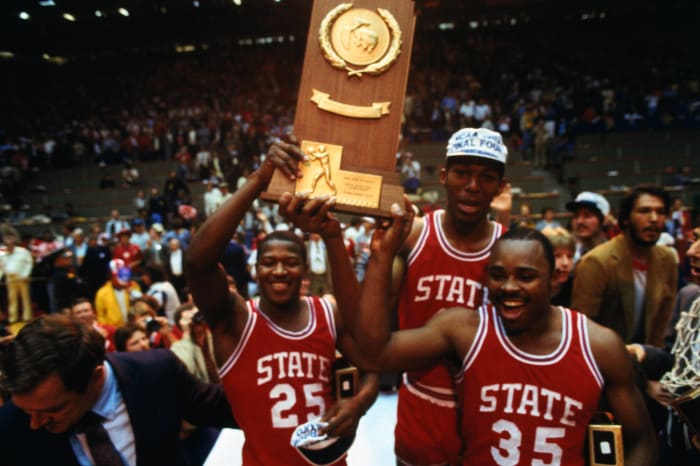
By now, anyone that fancies itself a true college basketball fan knows this story. The Wolfpack had 10 losses entering the ACC Tournament, and needed to win the event just to reach the Big Dance. They did, beating Michael Jordan's North Carolina Tar Heels and a Ralph Sampson-led Virginia squad along the way to claim the league championship. After needing two overtimes to beat Pepperdine in the first round, NC State eventually made it to the Final Four. A heavy underdog against Houston's Phi Slama Jama in the title game, the "Cardiac Pack" weren't done, stunning the Cougars on Lorenzo Charles' last-second dunk of a Dereck Whittenburg miss. Who can forget Wolfpack coach Jim Valvano searching for someone to hug in celebration.
1. Villanova (1984-85)
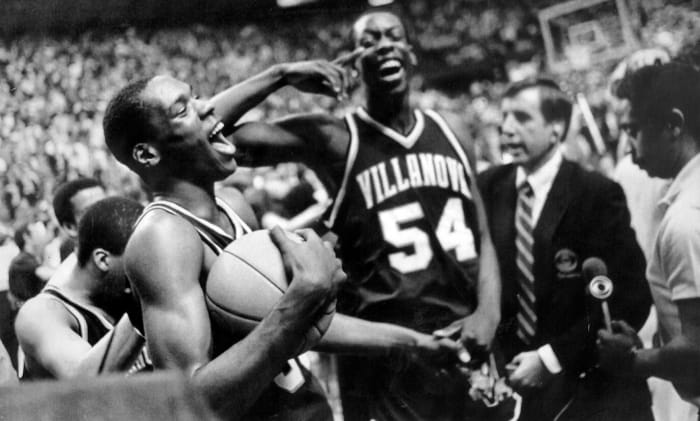
Two years after North Carolina State pulled off its improbable run to a national title, Villanova went a step better. Like the Wolfpack, these Wildcats were guided by a charismatic head coach in Rollie Massimino and had 10 defeats entering the tournament. As the No. 8 seed, 'Nova won its first three tournament games by a combined nine points, and when it managed to reach the national final, Big East rival and No. 1 seed Georgetown was waiting. It didn't matter. The Wildcats shot a remarkable 78.6 percent from the field and held the advantage on the defensive boards to pull out a stunning 66-64 victory — becoming the lowest seed to win the title in what's considered the greatest championship game upset in NCAA Tournament history.
A Chicago native, Jeff Mezydlo has professionally written about sports, entertainment and pop culture for nearly 30 years. If he could do it again, he'd attend Degrassi Junior High, Ampipe High and Grand Lakes University.
More must-reads:
- Where are they now? March Madness names of the past
- Best college basketball play-by-play announcers and analysts of all time
- The 'Leading scorers from the 1992-93 NBA season' quiz
Breaking News
Customize Your Newsletter
 +
+
Get the latest news and rumors, customized to your favorite sports and teams. Emailed daily. Always free!
Use of this website (including any and all parts and
components) constitutes your acceptance of these
Terms of Service and Privacy Policy.

